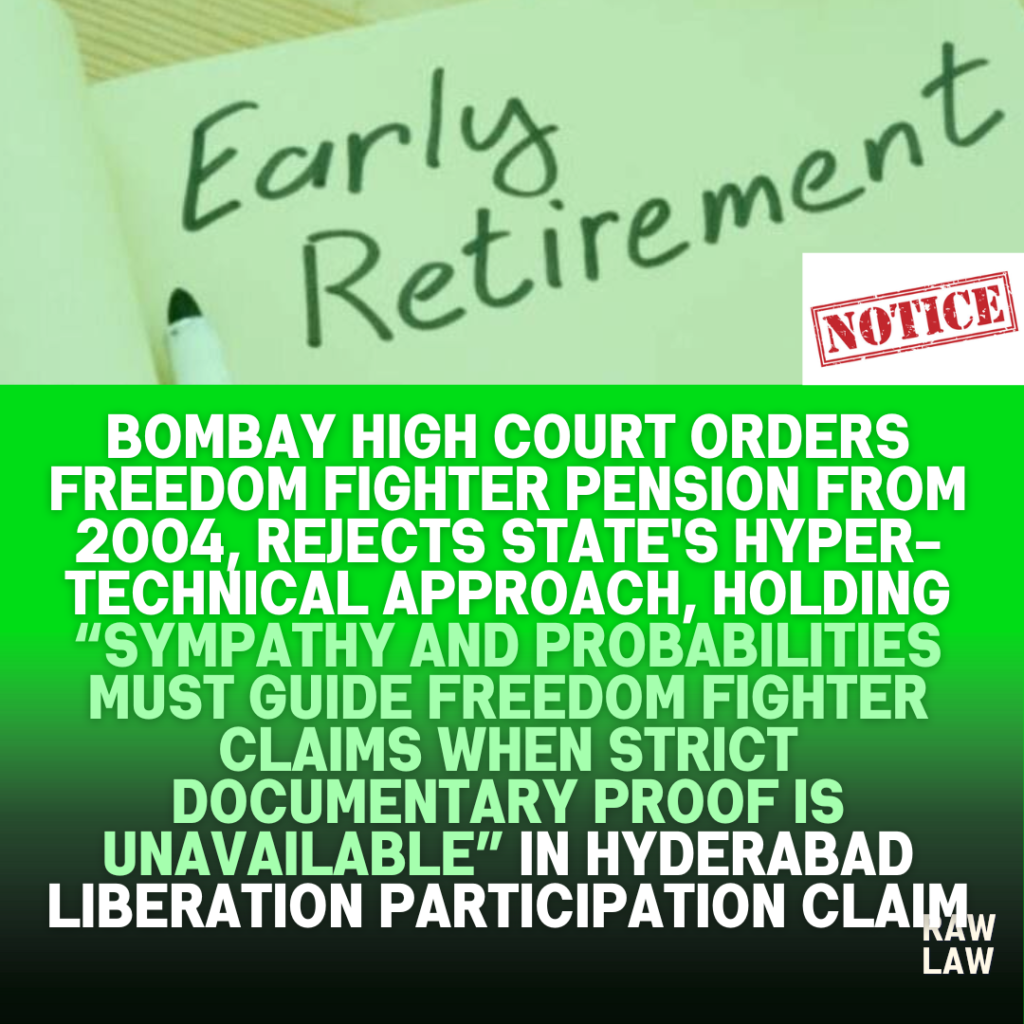Court’s Decision
The Bombay High Court allowed the writ petition filed by a Section Officer challenging her premature retirement. The Court quashed the retirement order, reinstated the petitioner with continuity of service, and directed the payment of all consequential benefits, holding that premature termination cannot override an employee’s legitimate expectation of continuance in service unless there are tangible reasons recorded with due process.
Facts
The petitioner, a Section Officer in the Goa Legislature Secretariat, was prematurely retired by the State on the grounds of alleged inefficiency and public interest, despite having a clean record. She contended that the order was passed without giving her an opportunity to be heard, and without any tangible adverse material against her. The petitioner highlighted that she was 59 years old with only one year remaining in service and that her removal caused severe financial and mental hardship. The State defended its action, stating that premature retirement was necessary in public interest under applicable service rules.
Issues
Whether the State’s action of prematurely retiring the petitioner without prior notice, without recording tangible adverse material, and without providing an opportunity of hearing, violated principles of natural justice and the petitioner’s legitimate expectation of continuance in service.
Petitioner’s Arguments
The petitioner argued that she had an unblemished service record and no adverse entries, making her premature retirement illegal and arbitrary. She contended that the impugned order lacked reasons and was passed in violation of principles of natural justice. The petitioner also argued that the removal was not in public interest but was an abuse of power to deny her the remaining service tenure and post-retirement benefits.
Respondent’s Arguments
The State argued that the power to prematurely retire an employee in public interest was inherent under the applicable service rules, which did not require a prior hearing. It submitted that the decision was based on overall assessment of the petitioner’s service and administrative needs, and that the Court should not interfere with administrative discretion unless there is a clear case of mala fide or manifest arbitrariness.
Analysis of the Law
The Court analysed the scope of premature retirement under service jurisprudence, emphasising that while the State has the power to retire an employee prematurely in public interest, this power must be exercised:
- Based on tangible material,
- With application of mind,
- Following due process,
- Without arbitrariness or colourable exercise of power,
- In alignment with the employee’s legitimate expectation of continuity in service.
The Court reaffirmed that public interest cannot be used as a cloak for arbitrary removal and that recording of reasons, even if briefly, is necessary to demonstrate fair application of mind.
Precedent Analysis
The Court relied upon:
- Baikuntha Nath Das v. Chief District Medical Officer (1992) 2 SCC 299 – Premature retirement can only be exercised on the basis of relevant material and in public interest, not arbitrarily.
- Union of India v. M.E. Reddy (1980) 2 SCC 15 – Recording of reasons and application of mind is essential even when prior notice may not be mandatory.
- Swami Saran Saksena v. State of Uttar Pradesh (1980) 1 SCC 151 – Principles of natural justice must be observed where prejudice is caused.
- Other decisions emphasising the scope of judicial review in service matters and upholding employee rights against arbitrary state action under the guise of public interest.
Court’s Reasoning
The Court held that the petitioner’s premature retirement was not based on any tangible adverse material or valid administrative necessity. The absence of a fair process and the lack of reasons in the impugned order violated the petitioner’s legitimate expectation of service continuity and principles of fairness. The Court stated, “State action curtailing service tenure must reflect fairness and accountability, not mechanical invocation of public interest.” The Court emphasised that such orders must pass the test of reasonableness, transparency, and fairness to sustain under judicial review.
Conclusion
The writ petition was allowed, with the High Court:
- Quashing the premature retirement order.
- Reinstating the petitioner with continuity of service and all consequential benefits.
- Directing payment of arrears due to her from the date of the impugned order until reinstatement.
The judgment reaffirms protection of government employees against arbitrary premature termination.
Implications
This judgment safeguards government employees from arbitrary premature retirements under the guise of public interest, reinforcing the need for tangible reasons and fair process. It clarifies the limits on administrative discretion in terminating service, ensuring adherence to principles of fairness, transparency, and legitimate expectation, while balancing administrative needs.
Short Notes on Referred Cases and Their Application
- Baikuntha Nath Das v. Chief District Medical Officer – Applied to hold that premature retirement must be based on relevant material and in public interest.
- Union of India v. M.E. Reddy – Cited for the need to record reasons even if prior notice is not mandated.
- Swami Saran Saksena v. State of Uttar Pradesh – Applied to emphasise that principles of natural justice must be upheld when terminating service prematurely.
These cases collectively reinforced the petitioner’s right to fairness, requiring the State to justify premature termination with clear reasons.
FAQs
1. Can a government employee be retired prematurely without notice?
While prior notice may not be mandatory under some rules, the State must record tangible reasons and act fairly in public interest.
2. What are the requirements for premature retirement in public interest?
It requires application of mind, presence of adverse material, and adherence to principles of fairness, transparency, and non-arbitrariness.
3. What reliefs are granted if premature retirement is found arbitrary?
The employee is entitled to reinstatement with continuity of service and all consequential benefits, including arrears, from the date of the wrongful termination.



